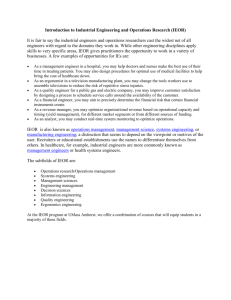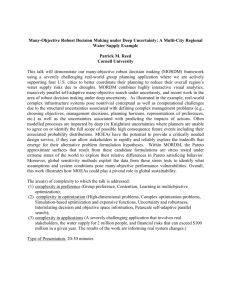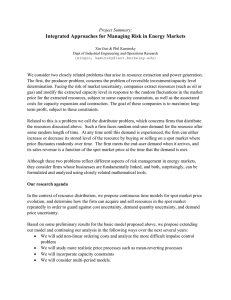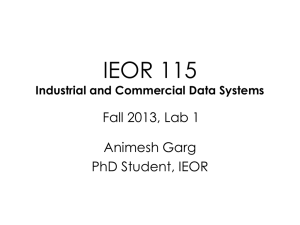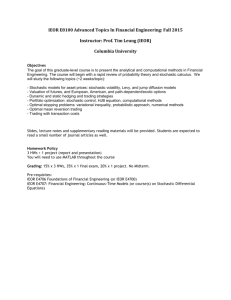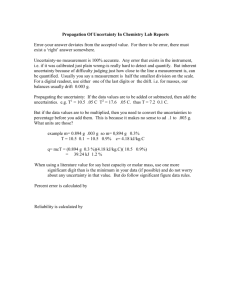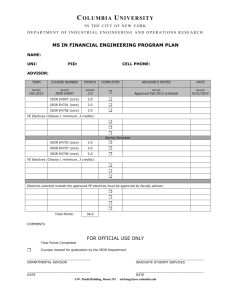IEOR Undergraduate Program Educational Objectives A. Program Educational Objectives
advertisement
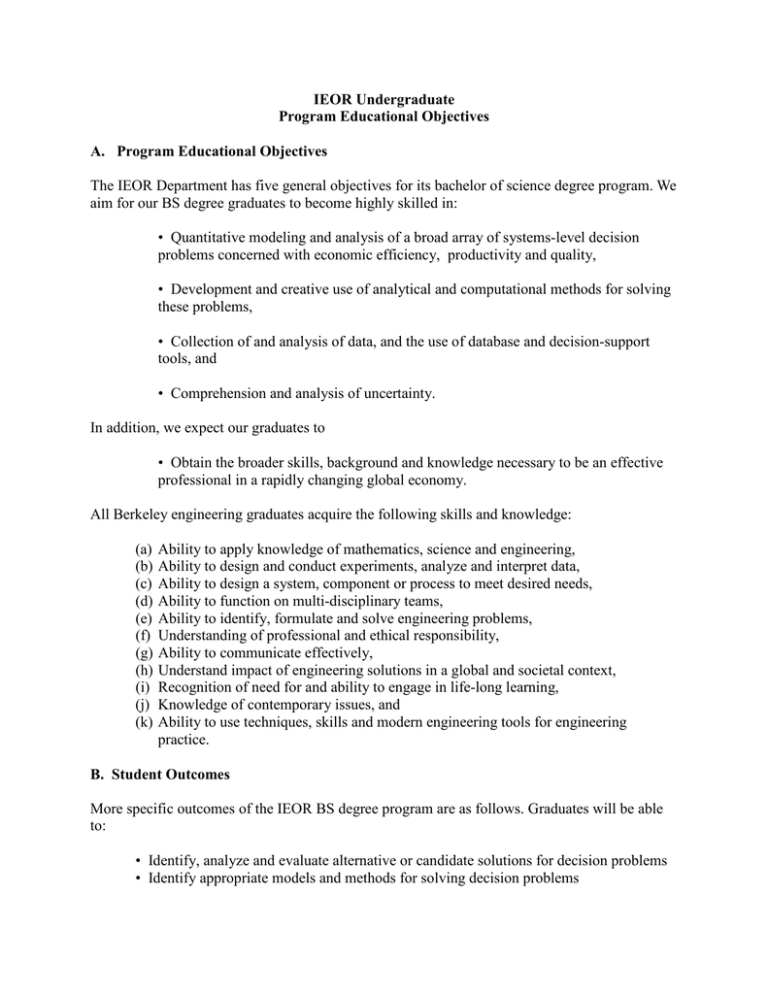
IEOR Undergraduate Program Educational Objectives A. Program Educational Objectives The IEOR Department has five general objectives for its bachelor of science degree program. We aim for our BS degree graduates to become highly skilled in: • Quantitative modeling and analysis of a broad array of systems-level decision problems concerned with economic efficiency, productivity and quality, • Development and creative use of analytical and computational methods for solving these problems, • Collection of and analysis of data, and the use of database and decision-support tools, and • Comprehension and analysis of uncertainty. In addition, we expect our graduates to • Obtain the broader skills, background and knowledge necessary to be an effective professional in a rapidly changing global economy. All Berkeley engineering graduates acquire the following skills and knowledge: (a) (b) (c) (d) (e) (f) (g) (h) (i) (j) (k) Ability to apply knowledge of mathematics, science and engineering, Ability to design and conduct experiments, analyze and interpret data, Ability to design a system, component or process to meet desired needs, Ability to function on multi-disciplinary teams, Ability to identify, formulate and solve engineering problems, Understanding of professional and ethical responsibility, Ability to communicate effectively, Understand impact of engineering solutions in a global and societal context, Recognition of need for and ability to engage in life-long learning, Knowledge of contemporary issues, and Ability to use techniques, skills and modern engineering tools for engineering practice. B. Student Outcomes More specific outcomes of the IEOR BS degree program are as follows. Graduates will be able to: • Identify, analyze and evaluate alternative or candidate solutions for decision problems • Identify appropriate models and methods for solving decision problems • Formulate mathematical optimization models for real-life decision problems • Understand methods for solving deterministic optimization problems and utilize optimization software for solving such problems • Formulate analytical models and develop computer simulations to predict and optimize systems under uncertainty • Develop models and utilize analytical tools and software to evaluate decisions under uncertainty • Understand performance measurement • Understand important concepts in manufacturing and service operations • Design and apply analytical models for manufacturing and service operations • Critique and reorganize business and industrial process flows and information flows • Structure data to support decisions related to the aforementioned topics • Understand organizational design and management issues A matrix of the relationships of these outcomes to the IEOR program objectives is displayed in Figure 1. The relative contributions of individual courses in the IEOR curriculum to these outcomes are displayed in Figure 2. The IEOR department evaluates learning in relation to its educational goals by administering and analyzing annual surveys of graduating students, alumni, employers, and graduate school admissions officers. In these surveys we ask participants to rate the achievement of our graduates in program outcomes and objectives, and we ask participants to rate the importance of our objectives and to suggest other objectives we should consider. The department also obtains feedback in this regard from an Industrial Advisory Board. Figure 1. Relationships Between IEOR Program Outcomes and IEOR Program Objectives Program Educational Objective (a) (b) (c) (d) (e) (f) Program Outcome Ability to apply knowledge of mathematics, science and engineering Ability to design and conduct experiments, analyze and interpret data Ability to design a system, component or process to meet desired needs Ability to function on multi-disciplinary teams Ability to identify, formulate and solve engineering problems Understanding of professional and ethical responsibility (g) (h) (i) (j) (k) Ability to communicate effectively Understand impact of engineering solutions in a global and societal context Recognition of need for and ability to engage in life-long learning Knowledge of contemporary issues Ability to use techniques, skills and modern engineering tools for eng. practice Quantitative Modeling of Systems-Level Problems x x x Development & Use of Analytical & Computational Methods x x x x Collection & Analysis of Data; Use of Database & Decision Support Tools Comprehension and Modeling of Uncertainty x x x x Broader Skills, Background and Knowledge to be an Effective Professional x x x x x x x x x x x x Formulate mathematical optimization models for real life problems x Understand methods for solving deterministic optimization problems Utilize optimization software for solving problems Analyze and evaluate alternatives or candidate solutions Identify appropriate models and methods for solving problems x x x x x x x Formulate analytical models to predict and optimize systems under uncertainty Develop computer simulations to model systems under uncertainty x x x Develop models to evaluate decisions under uncertainty Utilize analytical tools and software to evaluate decisions under uncertainty x Understand performance measurement Understand important concepts in manufacturing and service operations Design and apply analytical models for mfg. and service operations Critique and reorganize business and industrial process flows and info. flows Structure data to support decisions related to the aforementioned topics Understand organizational design and management issues Communicate well both orally and in writing; possess teamwork skills x x x x x x x x x x x x x x x x x x x Figure 2. Contributions of IEOR Courses to Program Outcomes (H = high, M = medium, L = low) Program Outcome Ability to apply knowledge of mathematics, science and engineering Ability to design and conduct experiments, analyze and interpret data Ability to design a system, component or process to meet desired needs Ability to function on multi-disciplinary teams Ability to identify, formulate and solve engineering problems Understanding of professional and ethical responsibility Ability to communicate effectively Understand impact of engineering solutions in a global and societal context Recognition of need for and ability to engage in life-long learning Knowledge of contemporary issues Ability to use techniques, skills and modern engineering tools for eng. practice E120 H M L 165 H H H 131 H H M M M 160 H 161 H L M M M H H M M H H H H H H H H H H H H H L H Formulate mathematical optimization models for real life problems Understand methods for solving deterministic optimization problems Utilize optimization software for solving problems Analyze and evaluate alternatives or candidate solutions Identify appropriate models and methods for solving problems H M L M H H M H H M Formulate analytical models to predict and optimize systems under uncertainty Develop computer simulations to model systems under uncertainty Develop models to evaluate decisions under uncertainty Utilize analytical tools and software to evaluate decisions under uncertainty M H M H L M Understand performance measurement Understand important concepts in manufacturing and service operations Design and application of analytic models for mfg. and service operations M L M M Critique and reorganize business and industrial process flows and info. flows Structure data to support decisions related to the aforementioned topics Understand organizational design and management issues Communicate well both orally and in writing; possess teamwork skills * dependent on student's project H M H H H H M M M H H H H H H * * * * M M H M L H M * * * * M H M M L 162 E190 180 115 130 140 150 151 153 166 170 171 172 H H L M M H H H H M H H M H M L M M H H H H M M H H H H H H H L L H H H H H H M H H M H H H M M H L M L M H H H H L H M M M M H M M M M L L L M M H H L L L L H M M H M M M M H M H H H H H H H H M H M M M H H M L H H H M M M L L M H M M H H L M L M M M M M M H H H H H M M H H M H H M M H H H H * H H H M H H M L M M L M M M L H H M M M M M H H H H L H H M H M M M M L M H H M M H M H M L L H H H
